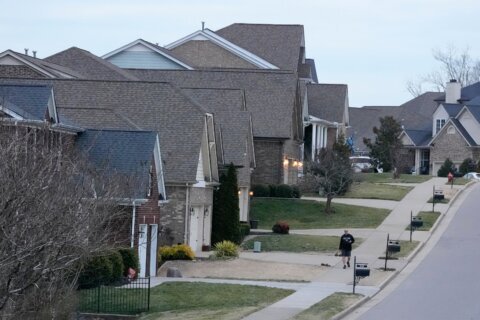A home’s proximity to the scene of a crime can be a deal-breaker for many homebuyers. Whether you’re choosing to sell your home to get away from rising crime rates, a recent homicide has left you feeling uneasy about the area or there have been reports of violence nearby, you may end up selling your home for less.
But by how much, exactly? Last month, Finder.com took the results of a University of Technology Sydney study that found home prices in Sydney, Australia, decrease by about 4.4 percent if they’re located within 0.2 miles of the scene of a homicide for a year following the crime. Finder.com applied the change to American murder rates, and calculated how much homes in the U.S. lose due to the drop in value. According to the results, the nationwide housing market loses an estimated $2.3 billion each year from property devaluation due to homicides.
A lot of that loss in property value comes after news of a crime spreads locally, often developing an aversion to the neighborhood from others who live in the city. “It all comes down to the psychological impact of the residents in the local area of where the homicide has occurred,” says Finder.com CEO Fred Schebesta. If you’re looking to sell your home, and it’s near the scene of a recent crime, or worse, is the scene of a crime, prepare for some difficulty selling it.
Violent crime isn’t the only stigma that can plummet your property value — Schebesta says meth labs and registered sex offenders in a neighborhood often have a negative effect on a home’s ability to sell. “Those two things tend to have quite an impact on property prices in an area,” he says.
They also affect the time it takes to sell a home, explains Roy Condrey, founder and co-CEO of DiedinHouse.com, which compiles reports on deaths that have occurred on properties, as well as records of fires or meth labs.
But a violent crime won’t necessarily ruin your chances of selling or even selling for a decent price. Here are some options if you’re looking to sell a house with a criminal history, or in a stigmatized neighborhood:
Check disclosure laws. Some states require you to provide information if a violent crime has occurred on your property; others simply state you must tell the truth if the buyer asks. Some states don’t require you to say anything.
Ryan Bailey, a certified general appraiser and owner of Bailey Valuation and Consulting in Tempe, Arizona, recommends talking to an attorney before you put a home on the market to ensure you’re meeting local requirements when it comes to disclosing violent crimes on a property.
For properties on which a reported violent crime has occurred, Bailey says state disclosure laws play a big part in the valuation. “In Arizona, that’s one of the things that the seller wouldn’t have to disclose,” Bailey says, “So that’s going to make a big difference as far as what the stigma level’s going to be, because the buyer might not even know about it.”
However, no state laws require you or your agent to tell a buyer about the murder down the street. In fact, discussing crime rates for the neighborhood could be considered discrimination under fair housing laws. Real estate agents are largely told to avoid providing specific details about crime, and instead direct potential buyers to crime statistic websites or recommend the buyer researches the neighborhood on his or her own.
Wait a year. A recent crime will be fresh on the lips of the locals and in the news, but the negative attention to the area won’t last forever.
After a year, it’s reasonable to assume people will forget, or at least no longer be gossiping about, the neighborhood. “The psychological impact of the homicide in the area will dissipate, because people tend to forget things and new people move into the area,” Schebesta says.
It’s no guarantee notoriety will disappear entirely, but the crime’s effect on your home price could be less detrimental, Bailey says. “The longer that you hold [the home], the less [the stigma] is going to be,” he says.
Take the loss and get out. At the end of the day, your safety and peace of mind are more valuable than a little money, so don’t stay in the area if the crime leaves you afraid to go outside.
“If you think it’s going to get worse, you might want to sell quickly,” and take the loss, Schebesta says.
Condrey says the knowledge of a death on the property isn’t always a deal-breaker, but it can be a bargaining chip for buyers to pull the price below similar homes in the area.
He puts it this way: “If I’m in a market where I have an option … I can say, ‘OK, well this house is comparable, you had a murder-suicide happen here. This isn’t like a roof you can fix or a cracked foundation you can fix. I can never erase this history and the stigma, I’m going to expect a discount here.'”
Prepare for gawkers. It’s a sad fact that when a property gets a lot of coverage for a horrific crime, there are people who will want to take a look.
Condrey says the house in Phoenix where Jodi Arias murdered Travis Alexander received significant attention when the trial started — much to the dismay of the new homeowners. Arias is currently serving a life sentence for the 2008 murder of her ex-boyfriend. The trial received widespread attention as a result of being aired on television.
“These homes are now tourist attractions. Like it or not, it’s the truth — especially the more tragic it is,” Condrey says.
However, there are times when the scene of an infamous crime can increase the value of the property by making it an attraction. “The property actually turns out to be worth more because of the notoriety of it.” Bailey notes.
Appraise for the situation. Whether it was a crime on your property or in your neighborhood, consulting an appraiser or real estate agent specializing in stigmatized properties can give you an idea of how much the sale price on your house could be affected.
Bailey, who appraises all types of stigmatized properties, including those impacted by crime, says he looks at the property with two sets of eyes: “Typically, we would look at it as is — what’s currently happening. And then we would look at it unaffected … so as if nothing occurred.”
He says properties with a stigma other than crime, like construction flaws, can also receive a valuation that calculates a home’s value if the problem is fixed. Unfortunately, little can be done to fix previous crime other than allowing time to pass.
Knowing what you’ll likely get for your home can help you decide if it’s best to wait awhile, or if it’s best to put it on the market soon.
More from U.S. News
10 Tips to Sell Your Home Fast
13 Photography Tips When Shooting Your Home to Put It on the Market
12 Tech Tools to Help You Sell Your Home Faster
How Homicide Affects Home Values originally appeared on usnews.com






